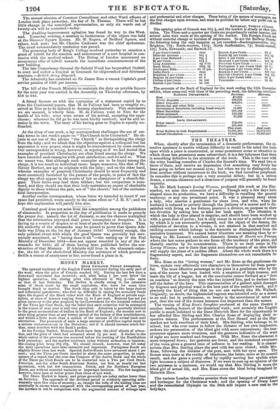THE THEATRES.
When, shortly after the termination of a dramatic performance, the at- tentive spectator is unable without difficulty to recall to his mind the basis upon which a piece is constructed, or some prominent scene or situation to which those less prominent seem subservient, it is a fair inference that there is something defective in the structure of the work. This is the case with the witty bustling comedies of Charles the Second's time. We read two or three of them, and receive an impression that something very lively has been going on before our mental eyes; but when we try to distinguish one from another without recurrence to the book, we find ourselves perplexed. In comedies this is perhaps not a very essential defect; but in a serious drama, a certain closeness and a clearness of purpose will generally be found requisite.
In Mr. Mark Lemon's Loving Woman, produced this week at the Hay- market, we miss this coherence of parts. Though only a few days have elapsed since its production, we have a difficulty in recalling the general tendency, or any one prominent point. It was a pleasant story about a lady, who marries a gentleman for sheer love, and who, when her husband is reduced to poverty through the jealousy of a usurer and is dis- satisfied with living on her fortune procures a divorce, on purpose to show her devotion by asking him to take her back again. The situation in which the lady is thus placed is singular, and should have been worked up with a great deal of power; but it only comes in as one of a series of events by which it is not necessarily prepared, and the object of the drama' the exhibition of devotion in a woman, is not attained in that marked and striking manner which belongs to the dramatic as distinguished from the narrative treatment. We cannot better illustrate our meaning than by re- ferring to Mr. Lemon's excellent domestic drama of Hearts are Trumps, where the last scene gathers to one focus all the tendency of the piece, and literally startles by its concentration. There is no such scene in The Loving Woman; nor is there that quiet neat development of an idea which will supply the place of a sudden effect. About the whole work there is a fragmentary aspect, and the fragments themselves are not remarkable for force.
Mrs. Kean as the "loving woman," and Mr. Kean as the gentleman she loves, sustain very efficiently two characters in themselves far from power- ful. The most effective personage in the piece is a gentleman who by the arts of the usurer has been loaded with a suspicion of high treason, and leads the life of a beggar, but at the conclusion comes forward as a " dens ex machine." to destroy the man who has injured him, and to declare him- self the father of the hero. This representation of a gallant spirit damaged by disgrace and physical want is the best part of the author's work, and is precisely the kind of thing that no one can embody like Mr. Wallack. Originally, no doubt, the highminded vagrant was intended only as a means to an end; but in performance, EC hearty is the accordance of actor and part, that the end of the drama becomes less important than the means. The version of King Rene's Daughter produced at the same theatre is another leading feature of the theatrical week; and certainly the English public is much indebted to the Dane Heinrich Herz for the opportunity he has afforded Mrs. Stirling and Mrs. Charles Kean of displaying their re- spective talents. The performances at the New Strand and at the Hay- market are both excellent of their kind. Mrs Stirling, who belongs to no school, but who ever seems to follow the dictates of her own inspiration, endows her personation of the blind girl with more naturalness; the tem- perament appears more vivacious, and the gestures indicative of the want of sight are more marked and frequent. With Mrs. Kean the character is more tempered down; her gestures are fewer, and the sustained sweetness of the voice gives a general tone of softness to her reading. It is charac- teristic that Mrs. Stirling plays the part with her eyes closed; while Mrs Kean, following the dictates of the poet, acts with her eyes open. The former aims more at the reality of blindness; the latter, more at its mental result, and she gains a pretty effect by rapidly moving her eyelids when light becomes a subject of discourse. If we were to sum up an opinion of the two actresses in a sentence, we would say that Mrs. Stirling is more the blind girl of actual life, and Mrs. Kean more the ideal being imagined by Heinrich Herz.


























 Previous page
Previous page